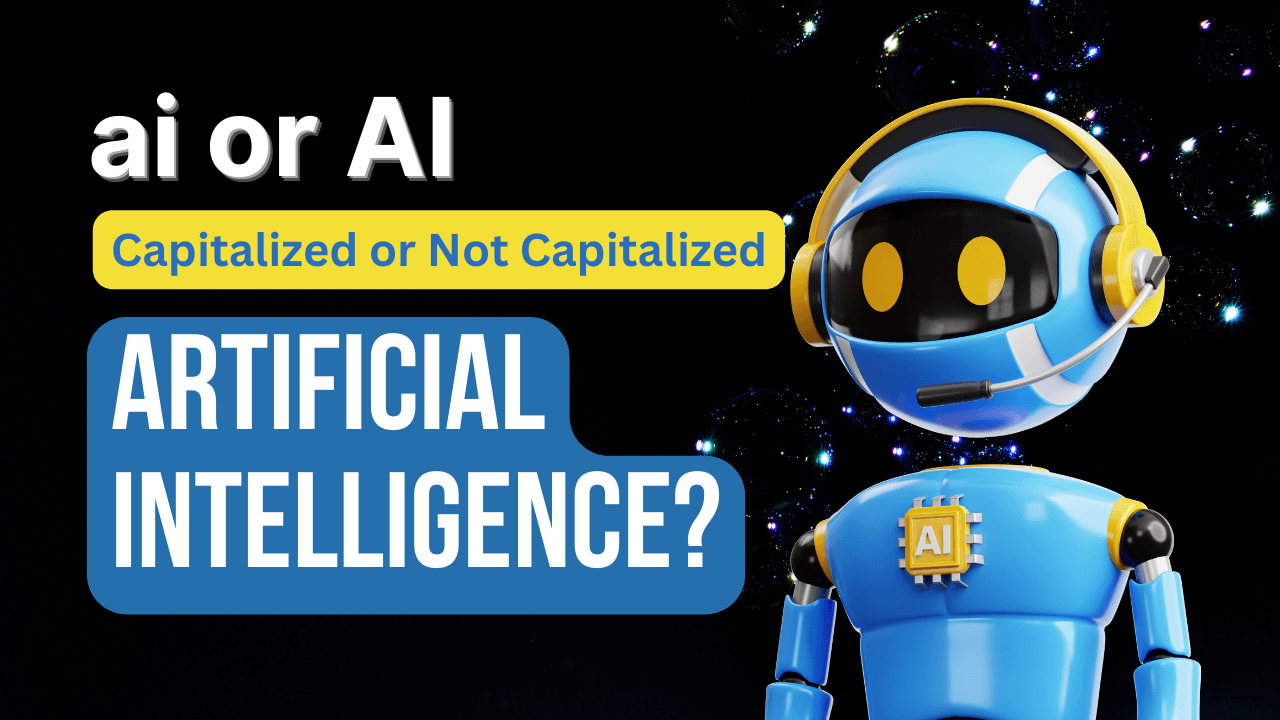Artificial Intelligence (AI) refers to machines performing tasks that normally require human intelligence, such as reasoning, learning, and decision-making. AI is an exciting field that continues to advance rapidly – yet writers often struggle with how best to write about it. One challenge faced when writing about artificial intelligence involves how it should be written – capitalized or uncapitalized? What about other terms like machine learning, deep learning, or neural networks? In this blog post, we will look at the rules and conventions associated with writing about it, as well as tips and examples that help writers write clearly and consistently.
Capitalize Artificial Intelligence When It Is Part of a Proper Noun
The first and most straightforward rule is to capitalize artificial intelligence when it is part of a proper noun, such as the name of an organization, a project, a product, or a publication. For example:
- The Artificial Intelligence Laboratory at MIT is one of the oldest and most influential research centres in the field.
- OpenAI is a research organization that aims to create and promote friendly artificial intelligence for the benefit of humanity.
- Watson is an artificial intelligence system developed by IBM that can answer questions asked in natural language.
- Artificial Intelligence: A Modern Approach is a popular textbook written by Stuart Russell and Peter Norvig.
In these cases, Artificial intelligence should always be capitalized as part of its name identifying an entity, similarly to how we capitalize other proper nouns like people’s names or brands’.
Do Not Capitalize Artificial Intelligence When It Is a Common Noun
The second and more general rule is not to use artificial intelligence when it is used as a generic noun, meaning a general term that refers to a concept, category, or phenomenon. For example:
- Artificial intelligence is the study of how to make machines intelligent.
- The development of artificial intelligence has many ethical and social implications.
- Many experts believe that artificial intelligence will surpass human intelligence in the near future.
- I am interested in learning more about artificial intelligence and its applications.
In these cases, Artificial Intelligence should not be capitalized because it does not form part of a proper noun; rather, it refers to an umbrella field of research and practice. We don’t capitalize common nouns such as animals’ names, plants’ names or professions as an analogy for this practice.
Follow the Same Rules for Related Terms
Artificial intelligence-related terms, including machine learning, deep learning, neural networks, natural language processing, and computer vision, should follow similar rules when capitalized as proper nouns versus when used as common nouns. For example:
- Machine Learning is a peer-reviewed scientific journal that publishes research on the theory and practice of machine learning.
- Machine learning is a subfield of artificial intelligence that focuses on building systems that can learn from data and experience.
- DeepMind is a company specializing in deep learning and artificial intelligence research.
- Deep learning is a branch of machine learning that uses multiple layers of artificial neural networks to learn from large and complex data sets.
- Neural Information Processing Systems (NIPS) is a prestigious annual conference that showcases the latest advances in neural networks and related fields.
- Neural networks are computational models that draw inspiration from the structure and operation of biological neurons.
As can be seen, capitalizing terms relates to whether they belong to a proper noun or common noun, not whether they are more specific than artificial intelligence. Therefore, always check their context and meaning before deciding whether or not to capitalize them.
Use consistent Capitalization Throughout your writing
Final and most critical rule is consistent capitalization throughout your writing. This means adhering to the same capitalization conventions for artificial intelligence-related terms in all parts of your document – title, headings, body content, references and appendices alike. If you decide to capitalize Artificial Intelligence in your title, capitalize it also in headings, body content and references/appendices accordingly; similarly, if machine learning appears uncapitalized within body content versus references/appendices and vice versa.
Utilizing consistent capitalization will help eliminate confusion and inconsistency in your writing and make your document more professional and credible. Furthermore, consistent capitalization makes it easier for readers to follow your arguments and understand your points more readily, so always proofread and check for any capitalization errors or discrepancies before submitting or publishing any work.
Conclusion
Writing about artificial intelligence and its subfields doesn’t need to be tricky! With some of the basic rules and conventions discussed here, writing artificial intelligence with confidence and accuracy should not be difficult at all. Make sure that artificial intelligence is capitalized as part of its proper noun form and doesn’t capitalize itself as part of a common noun form, just like related terms such as machine learning, deep learning, neural networks, or similar concepts, plus use consistent capitalization throughout all documents you produce! In doing this, you will ensure clarity for readers while effectively communicating messages across the documents you create.
